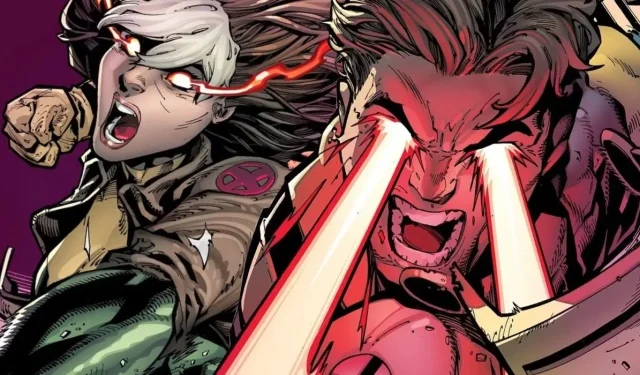
Warning: Spoilers for Uncanny X-Men #7 In the latest chapter of the X-Men saga, a familiar scenario unfolds as our heroes once again find themselves pitted against one another. However, this superhero conflict feels less authentic and earned than expected. While it’s evident that tensions between Rogue and Cyclops’ respective X-Men teams are rising, one must question the necessity of yet another intra-team struggle.
The current clash is chronicled in Uncanny X-Men #7, crafted by the team of Gail Simone, Edgar Salazar, David Marquez, Victor Olazaba, Matt Wilson, and Clayton Cowles. As the forces converge at Graymalkin Prison—an erstwhile X-Mansion now serving as a mutant holding facility—the narrative sets the stage for chaos. Yet, the underlying motivations for this confrontation feel somewhat forced, lacking the depth of character development needed to justify the fight.
The Latest X-Men vs. X-Men Conflict Lacks Depth
Rogue and Cyclops: Caught in a Misunderstanding
In Uncanny #7, the spark that ignites this altercation is a typically comic-book scenario—a misunderstanding. Rogue’s young teammate, Ransom, mistakenly perceives Cyclops as a threat, while Graymalkin’s telepathic influence escalates emotions. Misunderstandings can serve as a solid foundation for superhero showdowns; however, Rogue’s apparent acceptance of conflict before it even begins lacks credibility and feels inconsistent with her character’s journey thus far.
Prior to this point, the exchanges between the two teams had been marked by indirect tension and ambiguity, yielding a narrative that lacks clarity. This crossover occurs in the aftermath of the recently dissolved Krakoan era, with Cyclops emerging from that transformative period in a depressed state. Rogue acknowledges this in Uncanny #7, stating, “We all waited for you to step up.” Yet, this appeal for action feels unsubstantiated, as readers have not been privy to the emotional fallout that supposedly occurred.
Rogue’s Personal Struggles: An Overlooked Factor
The Need for Deeper Interaction
While it’s fair to acknowledge Rogue’s current struggles as she leads her own X-Men team—conflicted about her leadership role and her identity in the post-Krakoa landscape—this complexity needs more context. The lack of in-depth exploration into her motivations compounds the issue, as her aggression is portrayed without sufficient emotional background or meaningful interactions with Cyclops’ team prior to the conflict.
If you’re looking for an engaging X-Men story that sidesteps convoluted continuity, consider exploring Ultimate X-Men by Peach Momoko, available now in individual issues and collected editions from Marvel Comics.
A Disconnection Within the New X-Men Era
Lack of Communication Between Titles
This conflict between the teams exemplifies a more significant issue plaguing the latest era of X-Men storytelling: a disconnection between the various titles. Editor Tom Brevoort has shared insights on how each title’s independence has been prioritized, but with this approach, the overarching narrative feels disjointed. When asked about the driving motives behind the characters’ separation, one might instinctively say it’s simply the writers’ decision rather than a robust narrative choice.
I wish there were a clearer ideological conflict at play here; a more dynamic explanation for why Cyclops and Rogue’s teams are pitted against each other is sorely needed. While the inherent challenges facing the characters post-Krakoa are crucial, the narrative fails to provide compelling reasons for their divide. Instead, it feels like they are thrust into conflict merely for the sake of it, with writers orchestrating events instead of characters organically clashing.
[Rogue and Cyclops] are two characters who each lead what they believe to be the X-Men, so there’s going to be an obvious ideological clash there. Each group goes about being X-Men in their own way, and we’re going to see how those differences will create friction between them.
The Need for Greater Depth in Conflict
Similar Stakes Result in Diminished Impact
Unfortunately, Rogue and Cyclops do not exhibit enough distinction to bring a valuable ideological theme to the forefront of this clash. Both characters embody similar challenges and emotional arcs; Cyclops criticizes Rogue for her impulsiveness while she simultaneously attempts to enact a more stealth-based strategy. The irony here is apparent, yet their similarities overshadow any attempts to portray them as distinctly different leaders.
The introduction of the antagonistic mutant, Scurvy, appears to serve as an acknowledgment of the conflict’s shortcomings. If it weren’t for this external catalyst, there may not have been any convincing rationale for these teams to clash. While Scott and Rogue’s emotional saga may eventually align with the story’s conclusion, the execution falls short, leaving readers with an unsatisfying buildup.
Ultimately, one can surmise that the logical conclusion of this crossover will lead to a re-unification of the teams, yielding a cliché realization of mutual understanding. Although this ending is acceptable, the absence of significant tension hinders its impact, making it feel overly predictable. With only two issues remaining, the anticipation for meaningful resolution looms, leaving the audience eager for reconciliation among the X-Men.
Uncanny X-Men #7 is currently available from Marvel Comics.
Source: AIPT Comics




Leave a Reply